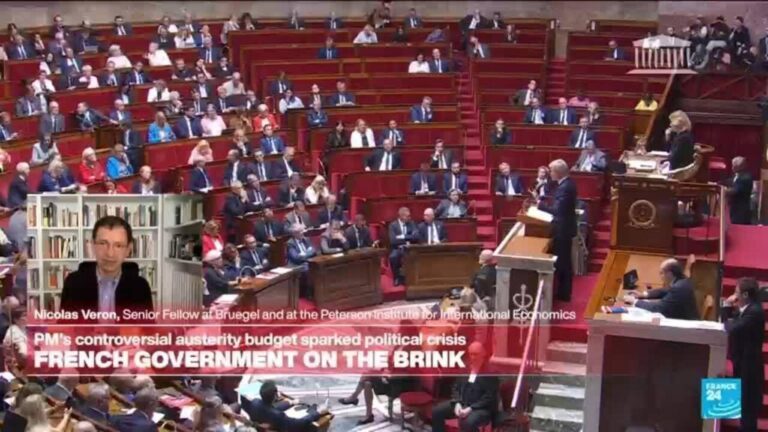France’s Political Crisis: Why Budget Showdown Heralds More Turmoil for Macron
In a challenging political landscape marked by escalating tensions and public discontent, France finds itself grappling with a budget showdown that threatens to deepen President Emmanuel Macron’s woes. As debates intensify over fiscal measures and economic reforms, the government’s efforts to navigate this critical juncture reveal the fragility of Macron’s leadership and the mounting pressure from opposition factions. This latest crisis not only underscores the challenges of governing in today’s France but also poses significant implications for the country’s future stability. With strikes and protests becoming increasingly common, the coming weeks could prove pivotal as the nation confronts the realities of its divided political climate.
Political Implications of the Budget Standoff for Macron’s Administration
The ongoing budget standoff is not only a fiscal struggle but a significant political battleground for President Macron’s administration. The tension between his government and opposition parties has escalated, threatening the stability of his second term. Macron’s reliance on controversial measures, such as invoking article 49.3 to bypass parliamentary approval for the budget, has intensified criticisms about his approach to governance. Observers note that these actions risk alienating moderate allies and emboldening far-left and far-right factions, which are keen to exploit public discontent.
As discontent rises among voters, especially regarding economic issues like inflation and social welfare cuts, MacronŌĆÖs administration faces the possibility of enduring political fallout. The current impasse may catalyze significant shifts within the National Assembly, where coalition dynamics are pivotal. Potential outcomes of this standoff include:
- Increased protests: As citizens express frustration over austerity measures.
- Coalition fragmentation: With allies questioning the government’s direction.
- Pushing for early elections: By opposition parties sensing an opportunity.
| Political Party | Projected Impact |
|---|---|
| La France Insoumise | Gaining support from dissatisfied voters |
| Rassemblement National | Potential gains in legislative seats |
| Les R├®publicains | Pressure to redefine their stance |
Economic Consequences: What the Budget Showdown Means for France’s Future
The recent budget showdown in France not only underscores the deepening political crisis faced by President Emmanuel Macron but also signals potential economic uncertainty that could ripple through various sectors. As the government grapples with mounting public dissatisfaction, the potential for austerity measures looms large. With increasing debates on tax reforms and public spending cuts, experts predict that the following economic implications could become more pronounced:
- Reduced Consumer Confidence: An unstable political landscape may drive consumer anxiety, leading to reduced spending.
- Investment Hesitance: Businesses may delay or retract investments due to fears of shifting policies and economic instability.
- Social Unrest: Rising dissent among the populace could lead to protests, potentially disrupting commerce and economic activities.
Moreover, a closer look at the figures reflects a concerning trend. The governmentŌĆÖs proposed budget cuts, if enacted, could impede growth projections for the coming years. The table below illustrates the projected GDP growth rate and unemployment rate under different scenarios, highlighting the potential ramifications of the ongoing budget debate:
| Scenario | Projected GDP Growth (%) | Unemployment Rate (%) |
|---|---|---|
| Business as Usual | 1.5 | 7.5 |
| Budget Cuts Implemented | 1.0 | 8.2 |
| Public Protest Escalation | 0.5 | 9.0 |
These scenarios serve as a stark reminder that the stakes are high, and the decisions made in the coming months will significantly impact not just the governmentŌĆÖs stability but also the broader economic landscape of France.
Public Sentiment: How Citizens View the Government’s Fiscal Decisions
The recent budget showdown in France has revealed a significant divide between the government and its citizens, with public sentiment largely critical of President Macron’s fiscal decisions. Citizens are increasingly expressing their discontent over government spending priorities, citing concerns over austerity measures that disproportionately affect vulnerable populations. Many believe that while political leaders negotiate over budget allocations, the voices of ordinary people are being drowned out. Key issues fueling this unrest include:
- Rising cost of living: Citizens are struggling to cope with increasing prices and stagnant wages.
- Social services cuts: There is widespread discontent over reductions in healthcare and social support programs.
- Lack of transparency: Many feel uninformed about where taxpayer money is being allocated.
This disconnection has led to a growing sense of disenchantment with the government’s ability to manage economic challenges effectively. Recent surveys indicate that a significant portion of the population views Macron’s fiscal policies as out of touch with their realities. In fact, as illustrated in the table below, the approval ratings for the government’s handling of fiscal matters have plummeted:
| Survey Period | Approval Rating (%) |
|---|---|
| January 2023 | 42 |
| March 2023 | 35 |
| September 2023 | 28 |
Navigating the Crisis: Recommendations for Stabilizing FranceŌĆÖs Political Landscape
As France grapples with an escalating political crisis, key recommendations aim to stabilize the current landscape and foster a constructive dialogue among stakeholders. Strengthening parliamentary cooperation can pave the way for bipartisan agreements, enabling the government to navigate budgetary challenges more smoothly. This cooperation could involve establishing regular consultation forums between opposing parties to share perspectives and forge compromises.
Furthermore, enhancing public communication is crucial. The government must actively engage with citizens to rebuild trust and transparency. Utilizing town hall meetings and digital platforms can facilitate direct dialogues, ensuring that the public feels heard and represented. Introducing independent advisory bodies could also provide objective assessments of proposed policies, alleviating the partisan tensions that have dominated recent debates. By prioritizing these strategies, France may find a pathway to restore stability and address the pressing issues at hand.
Key Takeaways
As France navigates through this turbulent political landscape, the showdown over the budget not only underscores the challenges President Emmanuel Macron faces but also raises critical questions about the future of his administration and the nation as a whole. With rising social unrest and a divided parliament, the road ahead appears fraught with difficulties. Observers will be closely watching how Macron manages dissent and seeks to build consensus amid mounting pressure. The implications of this crisis extend beyond France, potentially influencing economic stability and political dynamics across Europe. As the situation unfolds, the resilience of Macron’s leadership and the strength of democratic institutions will be put to the test in the coming weeks and months.




